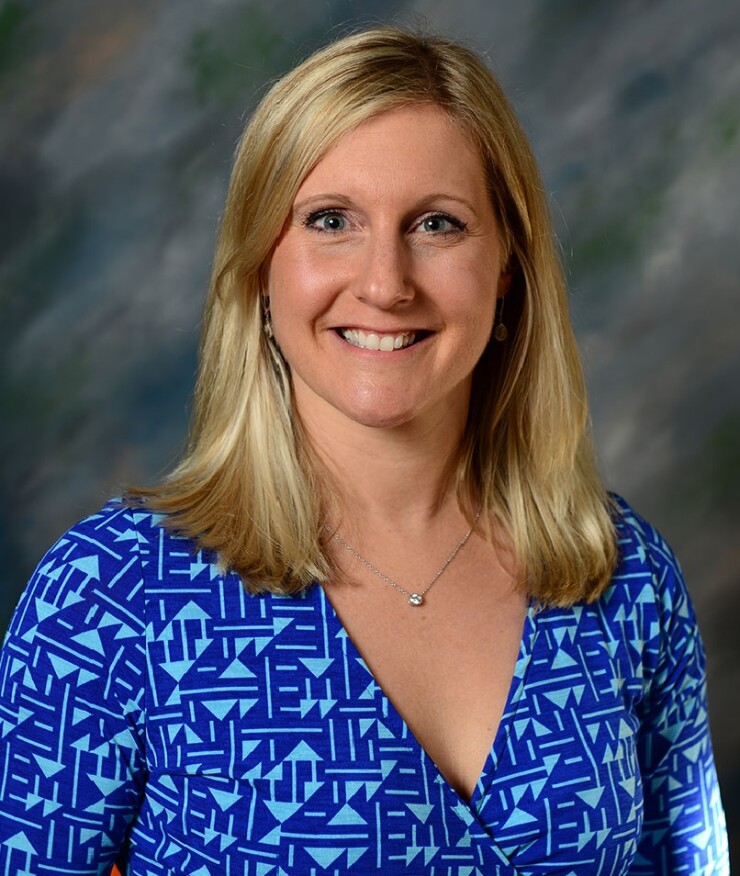Futurist Daniel Burrus makes the point that we should all be deeply interested in the future — because we’re going to spend the rest of our lives there.
With that in mind, every year Accounting Today takes a look forward to try to scope out what the profession can expect in the next 12 months, both by interviewing thought leaders and asking for their predictions, and by surveying accountants across the country on their firms’ plans in terms of hiring, technology spending, strategic planning, new service offerings, and much more.
Look for the results of our "Year Ahead" survey later this week; thee insights and advice of this year’s experts start below.
The 2019 panel skews young and new and innovative by design. Whether they’re fresh from a 40 Under 40 list, or new in their positions, or simply radical in their outlook, they each bring a unique perspective on the future that’s well worth exploring. They are: Jennifer Briggs, president and CEO of the Indiana CPA Society; Sarah Krom, managing partner at SKC & Co., and president of the New Jersey Society of CPAs; Jody Padar, CEO and principal of the New Vision CPA Group and author of “The Radical CPA;” Elizabeth Pittelkow-Kittner, controller at Litera Microsystems and a member of Council of the American Institute of CPAs; Danielle Supkis Cheek, a director at PKF Texas and incoming chair of the PCPS Technical Issues Committee of the AICPA; and consultant Garrett Wagner, CEO and founder of C3 Evolution Group.
What are the one or two trends that accountants should most keep an eye out for in 2019?

Garrett Wagner: First, firms need to adopt a learning culture and focus on more than just the technical skills. They need to truly embrace the soft/success skills that they have avoided for too long. These skills will serve as the key foundation to allow accountants to pivot to their role, embrace technology, and be comfortable being more proactive and forward-looking with their clients.
The second trend is to use those skills to pivot into advisory services as a key offering for the firm. Be those offerings strategic planning, client account services, or virtual CFO services, they all require practitioners to step out of their comfort zone and focus on delivering proactive, forward-looking advice. An important realization firms will make in terms of these services is that clients don’t just need these services, but want these services and truly value the proactive advice that they are able to provide to them. Right now virtually every small business in America has someone who prepares their tax return, but few have a virtual CFO, for example, despite the fact that most small to large businesses desperately need and want this type of advisor. In most instances, a client isn’t going to give you a hug for preparing their tax return, but they will give you a hug for being their virtual CFO and helping them to take control and grow their business.

Jennifer Briggs: Experimentation, experimentation, experimentation. CPAs need to change how they change. The change management process is great, but don’t let it stifle progress even if you don’t know the answer; the profession won’t move forward without better risk tolerance balanced with professional skepticism.
Jody Padar: It’s all about “the bots.” Artificial intelligence and machine learning is here and it’s working. Be ready to automate all your bookkeeping and bank reconciliations. Finally, [we have] technology that can really help us enhance our advisory services by giving us great data to start with.

Elizabeth Pittelkow-Kittner: We will continue to hear about technology changing the way we work. One trend we should focus on as accountants is the growing need for strong cybersecurity for our technology and our customers’ technology. The value of the data we store in our systems is too important to ignore the risks of someone improperly accessing the data. The smarter we become with protecting data, the more malicious the attempts become to access that data. Fortify your organization’s security so you are not an easy target. Once you are secured, ensure your clients are protected, too. Consider offering cybersecurity or technology consulting as a potential niche of your business.
Sarah Krom: The biggest trend in 2019 is efficiency and innovation. Whether through technology, service offerings, talent, etc., there needs to be major and continual innovation to improve efficiencies and to leverage different elements to provide a more valuable, impactful client service experience.

Danielle Supkis Cheek: Traditional accounting services are not going away; they are ever-evolving. Elevated customer service and tailored experiences are the foundation of business relationships.
There are many emerging specialty accounting software and services. The trend we see in the middle market is companies implementing multiple best-in-class software programs to build a cost-effective and advanced decentralized accounting and operational infrastructure. The past limitation to this configuration was integration, but with robotic process automation, we can create an integration bot. We foresee middle-market companies holding off longer on large-scale custom ERP systems.
Briggs: [Another trend is] more and more mergers and acquisitions with different types of professionals/firms. The CPA-led firm is something that [American Institute of CPAs president and CEO] Barry Melancon talked about a couple of years ago, but now I think we’re really seeing the effects of that and the expansion of services, not only in the biggest firms but in all sizes of organizations. From human resources to technology consulting to a myriad of different businesses — CPAs know how to serve clients and employers and they will use their skills to serve a wider and wider audience.
Pittelkow-Kittner: [Also], changes in the political landscape continue to impact how we operate as a profession. The Tax Reform Bill changed the Tax Code, which prompted us to interpret the new code sections and educate our clients. Additionally, several states have proposed broad deregulation bills, and more states are considering them. These bills could challenge what we have achieved in the states for CPA mobility and reciprocity.
What do you think will be the most surprising thing for accountants in the coming year?

Padar: How quickly the automation of lower-level tasks will take place. When you see what the technology can do, it’s so exciting to see what our future can evolve to.
Briggs: How busy they are, while at the same time continuously hearing how the audit is less relevant. The balancing act of getting through today and planning for tomorrow just gets riskier. Business is good right now. Very good. But I think the surprise will come throughout the year as more firms and companies recognize the need to greatly enhance their understanding of the way technology will change what they do and how they do it. I don’t know the time frame for implementation of a lot of the technology solutions, but I know the learning process needs to start earlier than ever.
Supkis Cheek: Even traditional service offerings are going to be impacted by innovation.
Wagner: As accountants, we like to think that we can wait to take action another year, and historically the pace of change was slow enough that firms were able to still grow despite their constant push to put off taking action. In the coming year more firms will be caught off guard as the pace of change accelerates. No longer are things like artificial intelligence something we only see in the movies, and we have 10 years until it comes to most CPA firms.
This rapid rate of change will see the gap between successful and struggling firms grow exponentially. Firms who are proactively taking action, embracing new technology, and learning the non-technical skills needed will grow at rapid rates across all key metrics, from top-line revenue, revenue per partner, and better ability to attract, retain and engage top talent. Those firms who are stuck in their ways will see the challenges they are faced with continue to grow and hurt the firm’s bottom line, see more people leave the firm, and really hurt revenue per partner.

Krom: The most surprising things for accountants in the coming year is going to be the continual increase in hiring talent that are not accountants by degree and certainly aren’t CPAs.
Pittelkow-Kittner: Accountants continually face more competition from other professionals, such as technology practitioners and other business consultants who know the trends in our profession and are educating our clients. Accounting firms are hiring fewer accounting majors and more non-accounting majors, which means we need to learn skills outside of technical accounting to keep up with professionals who demonstrate other competencies.
Accounting firms and departments also face competition for their talent and need to focus more time on providing better work environments. I have seen many millennials recently leave their larger organizations and start their own businesses because they believe they can do it better, and many are trying with the goals of being technologically savvy and future-focused.
Much is being made of the potential impact of automation, artificial intelligence and blockchain. Which, if any, of these do you think will have a major impact on accounting in 2019?
Briggs: All of them! I can’t stress enough how much I think these technologies will change the profession; the profession is so good at adapting, it’s an exciting time. First and foremost automation. It’s an incredible opportunity for CPAs to build on their trusted brand — their reputation for transparency, skills in verification, data analysis, regulatory, tax and accounting obligations. Technologies will always evolve; what’s different now is how quickly these new ways of doing things will need to make their way to smaller firms and companies. CPAs need to use standards and frameworks to think critically about where their skills lie and how they can provide the most value using the technology that’s burgeoning — just as they always have.
Pittelkow-Kittner: Automation, artificial intelligence and blockchain will all have impacts on accounting in 2019 by changing our processes and the way we interact with data. All three have been implemented in varying degrees across companies and firms.
What these three technology movements highlight is our absolute need for accountants to prioritize how we interact with clients. Our clients will become savvier and do more accounting functions on their own. We must go beyond our technical competence and work better with people by educating them on how the data we are processing can be used to improve their businesses. We should also be teaching them how to implement better technology into their businesses to be more competitive and sustainable.
Wagner: While all three will have a major impact on how the profession will drastically change, for 2019 we will see automation as having the largest immediate impact. Software vendors across the board have made huge strides in automation across various aspects of their software solution suites, and we are also seeing a drop in the cost for smaller firms to develop robotic process automation tools to automate various repetitive tasks that are currently taking up their time.
Supkis Cheek: Robotic process automation is already here and can easily be scaled to various tasks. There are certain platforms which allow non-technical users to create bots, and as a result, bots are going to start popping up all over the place.
Padar: All of the above. Finally, game-changing tech is ready for consumption. The sky is not falling, it’s opening us to a never-ending opportunities to add value and create a real impact for our customers. I can’t wait! Are you ready to make the radical changes to your practice that you will need to so that you can maximize the opportunity?
Krom: All of these items are going to have a major impact on accounting in 2019 and beyond. But we can’t just look internally. These areas are going to be impacting our clients; we have to raise our heads and look outside as our clients change, we cannot afford to be left in the dust. We have to be ahead of our clients in order to be trusted advisors and partners.
What one piece of advice would you give firms going into next year?
Pittelkow-Kittner: Take a risk and try something new relating to one of the trends being talked about in our profession, such as value billing or starting a new business line (e.g., cybersecurity). We work in an environment where it is riskier to not take risks. Be a firm that proactively changes by making educated strategic moves based on researched trends. Talk to people who are studying the trends, learn about them, and seek consultants who can help you implement a new technology or process. As you are implementing them, tell your clients how you are keeping up with the trends.
Krom: 2019 is the year of building the flexibility in your firm to create the ability to be nimble. The need to pivot in advance of changes needs to be built into the structure of your firm. If you don’t have a culture in your organization to change quickly and often, you need to look at your infrastructure and environment and make those modifications in 2019 so that you can.
Wagner: Change. It is as simple as that. For any firm, regardless of size, that wants to have a successful 2019, they need to embrace the notion of change and take at least one proactive step to improve the vision, technology and people at the firm. This could be a small, overdue step, like finally becoming a truly paperless firm, or a larger step, like adopting an AI solution to improve their audit efficiencies. Change is not easy or comfortable; unfortunately as a profession we are running out of time to continue to put off change.
Supkis Cheek: If you are only looking at current technology options for your clients or in-house engagement efficiency, you’re already behind.
Briggs: Instead of, or in addition to, a partner/management retreat, have your newest staff hold their own retreat. Do they know the business or the customers/clients the way you do? No. But do they have a fresh perspective that could provide future-focused ideas? Absolutely. Have them present their thoughts or recommendations to the management team and then work together to see where to get started. This provides a growth opportunity for staff as well — if they feel more invested they might even stick around longer.
Oh, and a bonus piece of advice that’s likely controversial — senior management should call in sick unexpectedly once in a while and let someone else cover their client meeting or the financials presentation, etc. Practice, practice, practice — give everyone chances to practice the skills they need for the future. There’s just no substitute for doing it.
Padar: Digital transformation is here. Are you open to its possibilities, or will you stick your head in the sand and whine? The future looks bright.




